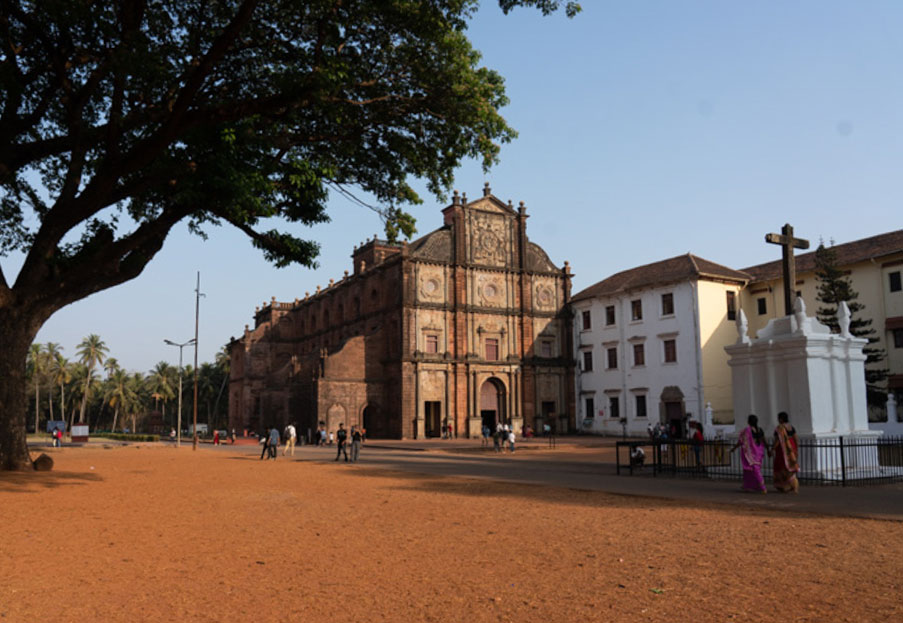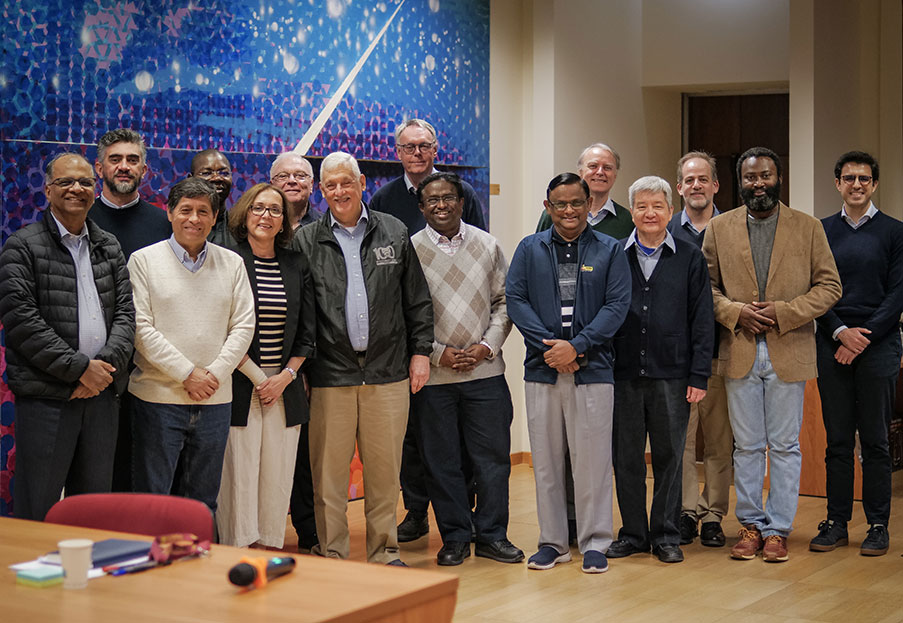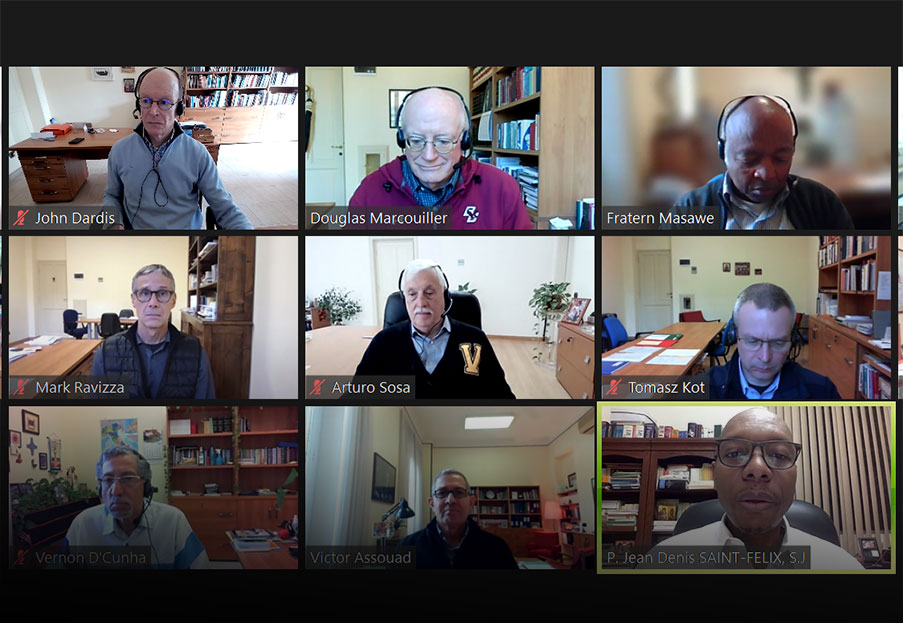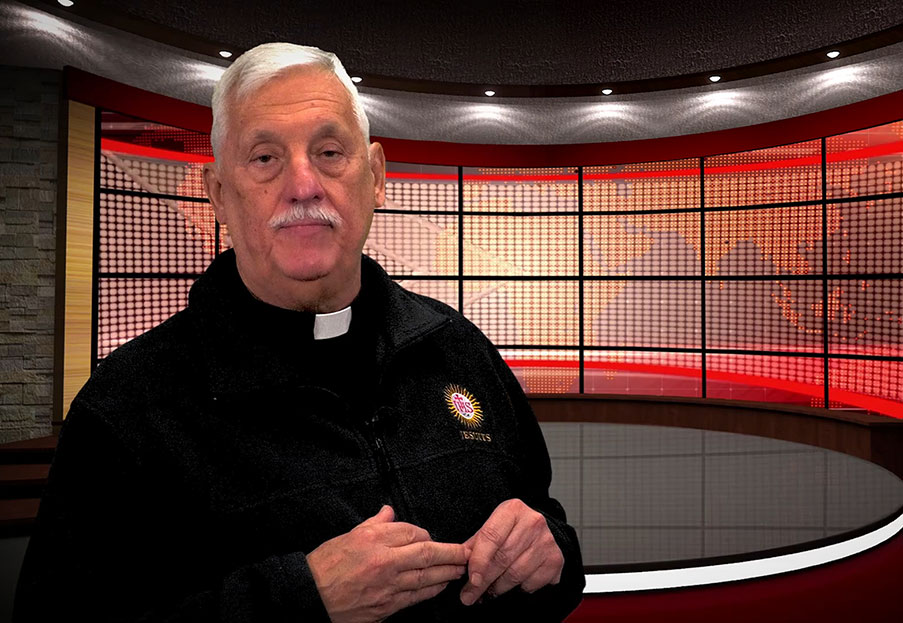Migrazione e frontiere: è davvero una cosa seria!
Tre membri della Curia Generalizia sono intervenuti al webinar organizzato dalla Pontificia Università Comillas di Madrid, sul grande tema delle migrazioni. Il nostro sito aveva annunciato questo evento, che ha accompagnato il lancio di un lavoro di ricerca diretto dall’Istituto Universitario di Studi sulle Migrazioni della Pontificia Università dei gesuiti della capitale spagnola.
Gli interventi del P. Arturo Sosa, Superiore Generale,
del P. Tom Smolich, Direttore Internazionale del JRS (Servizio dei Gesuiti per
i Rifugiati) e del P. Xavier Jeyaraj, Segretario per la Giustizia Sociale e l’Ecologia
della Compagnia di Gesù, sono stati tutti e tre molto interessanti.
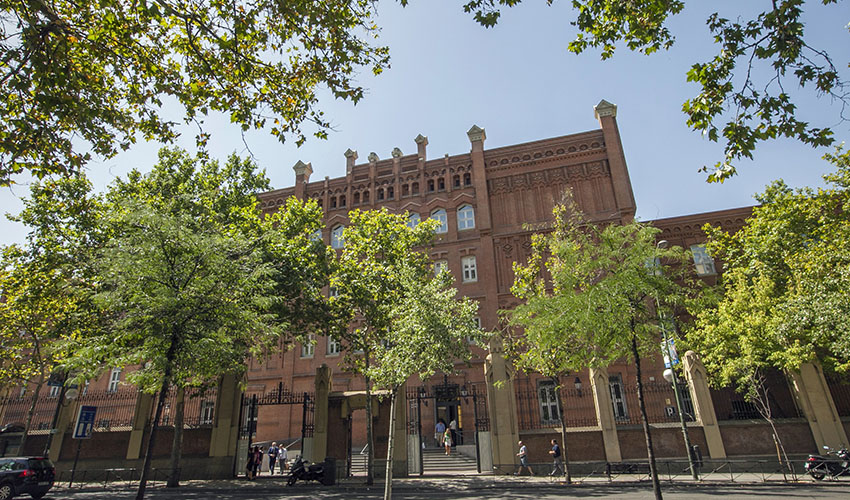
Secondo il p. Sosa, il dibattito pubblico sulle strategie degli Stati e delle organizzazioni umanitarie nei confronti di migranti, sfollati e rifugiati ha assunto una nuova dimensione nel contesto della pandemia del COVID-19. Siamo a un crocevia storico creato dai flussi migratori e dalle emergenze umanitarie. Stanno emergendo domande sulla diversità nelle nostre società, sulle relazioni internazionali e persino sui nostri stili di vita. Il Superiore Generale ha ribadito l’importanza centrale della giustizia per i rifugiati e i migranti da quando il padre Pedro Arrupe ha fondato il JRS. Egli ha inoltre sottolineato come lo sfollamento forzato di intere popolazioni pone nuove sfide per accompagnare i dimenticati del mondo. Egli ha ripetutamente collegato il lavoro della Compagnia di Gesù agli appelli profetici e ai richiami di Papa Francesco per difendere i diritti dei rifugiati, degli sfollati, delle vittime della guerra e del traffico di esseri umani. Le cause di questi mali mondiali devono essere affrontate, per cui il lavoro accademico in questo settore è essenziale.
Tom Smolich, del JRS, ha colto l’occasione per
sottolineare i contesti “di frontiera” in cui si svolge il lavoro dell’opera
internazionale dei gesuiti da lui diretta. Dall’esodo dei boat people vietnamiti all’inizio degli anni ’80, ci sono stati
molti luoghi caldi nel mondo in cui il JRS è stato coinvolto, dove la
sofferenza doveva essere alleviata. In America Latina e in Asia, poi molto in
Africa, e anche nei Balcani; più recentemente, in Afghanistan, Sri Lanka e,
naturalmente, in Siria. Il JRS si è spesso trovato a lavorare su entrambi i
lati delle frontiere terrestri o marittime dove si svolgevano tragedie umane. Anche
lui ha parlato di Papa Francesco, accogliendo con favore il fatto che il suo
messaggio per la Giornata Mondiale del Rifugiato 2020 si concentra sul dramma
degli sfollati interni, un dramma poco visibile ma davvero traumatico per più
di 50 milioni di persone. La pandemia del coronavirus ha evidenziato la gravità
della situazione perché molti di questi sfollati non hanno la necessaria
protezione, né accesso alle strutture sanitarie. Il COVID-19, ha insistito,
aiuta a rivelare le nostre ferite e le ingiustizie su scala universale.
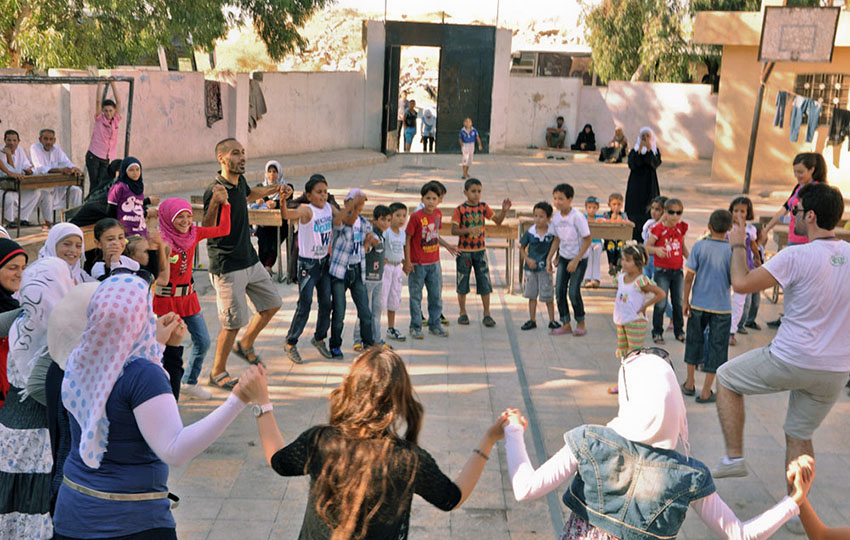
Xavier Jeyaraj del SJES ha detto che il suo contributo al libro lanciato quel giorno si è concentrato sulla migrazione interna nel suo paese, l’India. Voleva spiegare le cause, i tipi e i modelli di migrazione e come siano colpite, nel contesto attuale, le comunità più fragili; tra cui ci sono i Dalit, i membri di gruppi tribali, i membri di caste svantaggiate - e spesso più in generale le donne e i bambini. Egli ha sottolineato l’importanza di raccogliere dati più completi sulle migrazioni all’interno dell’India per avere un quadro reale della situazione delle circa 120 milioni di persone colpite dal fenomeno. Ha identificato sfide e opportunità nella situazione attuale, in particolare nel contesto indiano.
Potete leggere gli interventi completi di questi tre
gesuiti nella loro lingua originale qui sotto:
El debate público sobre la tragedia de los migrantes y refugiados forzados ha tomado una nueva dimensión como consecuencia de la pandemia del COVID-19. Estamos siendo testigos de una encrucijada histórica en la que los flujos migratorios y las emergencias humanitarias plantean interrogantes sobre nuestro modo de vida. Cómo entendemos las relaciones internacionales, cómo gestionamos la diversidad en nuestras sociedades y cómo respondemos a la situación traumática de las familias que cruzan las fronteras y llaman a nuestras puertas se ha convertido en una prioridad.
En cifras del ACNUR correspondientes a 2019, hay alrededor de 763 millones de migrantes internos en todo el mundo y 271,6 millones de migrantes internacionales, lo que equivale al quinto país más poblado del mundo. Más de 70,8 millones de personas se ven obligadas a abandonar sus hogares debido a conflictos armados, violencia generalizada o desastres naturales. De estos migrantes, 26 millones son refugiados, 41,3 millones son desplazados internos y 3,5 millones son solicitantes de asilo. Lamentablemente, el Mar Mediterráneo se ha convertido en el mayor cementerio del mundo, donde más de 18 mil personas han perdido la vida en los últimos cinco años.
El Santo Padre Francisco nos recuerda que detrás de esos números se encuentran personas: “Es necesario conocer para comprender. El conocimiento es un paso necesario hacia la comprensión del otro. Cuando hablamos de migrantes y desplazados, nos limitamos con demasiada frecuencia a números. ¡Pero no son números, sino personas! Si las encontramos, podremos conocerlas. Y si conocemos sus historias, lograremos comprender.”
La Compañía de Jesús está comprometida activamente en promover la justicia para los migrantes y los refugiados. El P. Pedro Arrupe fundó, en 1980, el Servicio Jesuita a Refugiados. En los últimos 40 años, los jesuitas consideramos que la misión de los migrantes y refugiados es "una gracia y una responsabilidad para todos nosotros".
La Congregación General 35ª, en 2008, reafirmó que prestar servicios a los migrantes, los refugiados, los desplazados internos y las víctimas de la trata de personas es una preferencia apostólica de la Compañía. Ocho años más tarde, la Congregación General 36ª pidió a la Compañía responder a la llamada de Cristo que nos sigue convocando a servir a los pobres y a los excluidos:
“Entre estas diversas formas de sufrimiento que han aparecido con consistencia en muchas de nuestras Provincias y Regiones están los desplazamientos de población (refugiados, emigrantes y desplazados internos): Ante las actitudes de hostilidad hacia estas personas, nuestra fe invita a la Compañía a promover dondequiera que sea, una más generosa cultura de la hospitalidad.” Este compromiso de la Compañía con los “descartados” de las actuales estructuras sociales lo queremos expresar más en hechos que en palabras. El reciente proceso de discernimiento que condujo a la promulgación de las Preferencias Apostólicas Universales confirma nuestro compromiso "de atender a los migrantes, desplazados, refugiados y víctimas de guerras y tráfico de personas". Como misión de la Iglesia recibida a través del Santo Padre, la Compañía ha aceptado "continuar ayudando a crear condiciones de hospitalidad, acompañar a todas estas personas en su proceso de integración en la sociedad y promover la defensa de sus derechos".
En estos tiempos difíciles, la Compañía de Jesús ha sido inspirada por el liderazgo profético del Papa Francisco en su misión de acompañar, servir y defender a los migrantes y refugiados. Nos inspira su insistente súplica a la comunidad internacional de ofrecer una respuesta práctica y compartida a la realidad de los refugiados y migrantes articulada en cuatro verbos: acoger, proteger, promover e integrar. Con el Papa Francisco queremos propiciar la conversión fundamental, el necesario cambio de actitud, "para superar la indiferencia y contrarrestar los temores".
El Servicio Jesuita a Refugiados ha sido el instrumento de la respuesta coordinada de la Compañía de Jesús a la situación de los refugiados. Al mismo tiempo, la Compañía de Jesús participa en una extensa red de instituciones especializadas que trabajan con migrantes y desplazados. Otras instituciones dentro de la amplia familia ignaciana están también comprometidas con la causa de diversas maneras. Parroquias, centros de retiro, escuelas, centros sociales y universidades han sido lugares de acogida, acción social e investigación para la defensa de esta causa, a menudo en colaboración con el Servicio Jesuita a Refugiados y la Red de Migración. Muchas comunidades jesuitas también han acogido a personas o familias migrantes o refugiadas. El servicio a los migrantes, refugiados y desplazados ofrece al cuerpo apostólico de la Compañía una profunda y privilegiada oportunidad de acompañar el sufrimiento de la humanidad, de prestar un servicio que promueva la reconciliación, abra oportunidades para la formación humano-espiritual y permita caminar juntos hacia un futuro mejor.
Los migrantes están presentes en todas las regiones del mundo. Acompañarlos y servirlos es una responsabilidad de todo el cuerpo de la Compañía; queremos hacerlo en todos los lugares donde estamos presentes. Este libro ofrece estudios de casos de situaciones críticas en las fronteras y algunos flujos migratorios en varias partes del mundo. Ofrece un instrumento iluminador de los desafíos que muchas instituciones jesuitas enfrentan en sus esfuerzos por ayudar y apoyar a las personas desplazadas o refugiadas.
El servicio a los refugiados y migrantes requiere la guía el Espíritu en un discernimiento y planificación apostólica que permita uso efectivo de los escasos recursos disponibles. Nos obliga a profundizar nuestra vocación de colaboradores en una misión que sólo es posible si se combinan los esfuerzos de muchas personas e instituciones. También nos exige mejorar nuestra capacidad de trabajar en red, haciéndonos más eficaces en la visibilización de la situación de los refugiados y en la promoción de acciones para mejorar su integración en los países de acogida.
Sólo si trabajamos juntos el mundo podrá abordar las causas del desplazamiento forzoso en sus raíces y poner fin a un fenómeno que produce tanto sufrimiento a tantas personas de todas las edades y condiciones socioeconómicas.
Este libro es un intento significativo de encarnar
esta aspiración de caminar junto a los migrantes y refugiados, como nos exige
nuestra vocación.
There is an important debate amongst the public about the tragedy of forced migrants and refugees. We are bearing witness to a historic crossroad where migratory flows and humanitarian emergencies are raising questions about our way of life. How we understand international relations, how we manage diversity in our societies, and how we respond to the traumatic situation of the families that knock on our doors and cross borders has become a priority.
Nowadays, according to the data provided by the UNHCR, there are about 763 million internal migrants worldwide and 271.6 million international migrants equivalent to the fifth most populous country in the world. Over 70.8 million people are forced to leave their homes due to armed conflicts, generalised violence, or natural disasters. Out of these migrants, almost 26 million are refugees, 41.3 million are internally displaced, and 3.5 million are asylum applicants. Sadly, the Mediterranean Sea has become the largest cemetery in the world where more than 17,821 people have lost their lives in the last five years.
Pope Francis reminds us that behind those numbers are people: “You have to know in order to understand. Knowledge is a necessary step towards understanding others. When we talk about migrants and displaced persons, all too often we stop at statistics. But it is not about statistics, it is about real people! If we encounter them, we will get to know more about them. And knowing their stories, we will be able to understand them.”
The Society of Jesus has committed actively to promoting justice for migrants and refugees. Fr. Pedro Arrupe founded the Jesuit Refugee Service in 1980, and in the last 40 years, the Jesuits feel that the migrant and refugee mission is “a grace and a responsibility for us all.”
The 35th General Congregation (GC 35) in 2008 reaffirmed that providing services to migrants, refugees, the internally displaced, and victims of trafficking, is an apostolic preference of the Society. Eight years later, the GC 36 called upon the Society to respond to the call of Christ who has summoned us anew to serve the poor and the excluded:
Among these various forms of suffering that have appeared with consistency from many of our Provinces and Regions is the displacement of peoples (refugees, migrants, and internally displaced peoples): In the face of attitudes hostile to these displaced persons, our faith invites the Society to promote everywhere a more generous culture of hospitality.
This love of the Society for the poor is expressed in deeds more than words. This has been recently confirmed by the process of discernment that led to the promulgation of the Universal Apostolic Preferences, among which is our commitment “to care for migrants, displaced persons, refugees, and victims of wars and human trafficking.” As a mission of the Church through the Holy Father, The Society has accepted to “continue to help create conditions of hospitality, to accompany all these people in their process of integration into society, and to promote the defense of their rights.”
In these challenging times, the Society of Jesus has been freshly inspired in its mission to accompany, serve, and advocate for migrants and refugees by the prophetic leadership of Pope Francis, who has called on the international community to have a shared response to refugees and migrants articulated in four verbs: to welcome, to protect, to promote, and to integrate. Pope Francis has insisted that what is needed is a fundamental conversion, a change in attitude, “to overcome indifference and to counter fears.”
While JRS has been the focal point of the Society’s coordinated response to refugees, the Society of Jesus has developed an extensive network of specialised institutions working with migrant and displaced people. In addition, there are other institutions committed to the cause within the wider Jesuit family. Parishes, retreat centres, schools, social centres, and universities have been places of welcome, social action, and research for advocacy often in partnership with the JRS and the Migration Network. Many Jesuit communities have also welcomed individual migrants, refugees, and families.
Serving migrants, refugees and displaced people offer the apostolic body of the Society a profound and privileged opportunity to accompany the suffering of humanity. Walking with the dispossessed as we search together for a future through reconciliation and rendering a service that not only brings healing to the present but also creates resources and opportunities for human and spiritual formation towards a better future.
Migrants are present in every region of the world. The call to accompany and serve them is a responsibility given to the entire body of the Society, and it must resonate everywhere we are present. Case studies of critical situations at borders and different migratory flows in several parts of the world is the focus of this book. It offers an insightful instrument for analysing the challenges that many Jesuit institutions face in their efforts to help and support displaced people, displaced people, and refugees.
This service to refugees and migrants requires a discernment that strives to be guided by the Spirit and apostolic planning that makes effective use of human and all other available resources. It obliges us to deepen our vocation as collaborators in a mission that is only possible if our many efforts are combined. It also demands that we improve our ability to work through networks that make better use of our resources, rendering us more effective in making the situation of refugees visible, and in promoting actions to improve their integration in host countries.
Only if we work together will the world be able to address the causes of forced displacement at their roots and end a phenomenon that produces so much suffering for so many people of all ages and socio-economic backgrounds. This book is a significant attempt to embody this aspiration for us to walk together to help migrants and refugees, as the GC 36 has called on us to do. Nine Institutions that the Society of Jesus has endowed the work with mi-grants, refugees and displaced persons have developed a joint work, participating the following organisations: the Secretariat for Social Justice and Ecology in the General Curia in Rome, the Jesuit Refugee Service, the Migration Net-work (Jesuit Migrant Services and Jesuit Network with Migrants), the GIAN Migration, and the University Institute of Studies on Migration at Comillas Pontifical University, which coordinated and funded this publication.
Permítanme compartir un poco de historia sobre el JRS y las fronteras donde trabajamos. Compartiré después algunos aspectos importantes de la necesaria colaboración para que la Compañía de Jesús profundice y extienda su servicio en y a través de estas fronteras.
Inspirado
por el generoso amor y ejemplo de Jesucristo, el Servicio Jesuita a Refugiados
(JRS) es un ministerio de la Compañía de Jesús. Nuestra misión es acompañar,
servir y defender los derechos de los casi 80 millones de desplazados forzosos
que hay hoy en el mundo.
El JRS fue fundado en noviembre
de 1980 por el Padre Arrupe SJ, entonces Superior General de la Compañía de
Jesús, para responder a la difícil situación de losboat people, losrefugiados vietnamitas que
huían de su patria devastada por una larga guerra.
En los años 80, JRS respondió a los conflictos en América Latina y Asia, y también a los refugiados que llegaban a Europa. En los 90s,el JRS comenzó un trabajo extenso en África, y tuvo una presencia importante en el conflicto de los Balcanes. El JRS a menudo trabajó en ambos lados de las fronteras terrestres y marítimas.
El nuevo siglo vio al JRS comenzar programas en Afganistán y Sri Lanka, y en la última década, nuestro trabajo en Siria con los refugiados iraquíes fue el punto de partida para un amplio acompañamiento de refugiados en el Medio Oriente y se extendió a Grecia, el sudeste de Europa y más allá.
Por lo general, asociamos las fronteras con las fronteras internacionales, pero más del 60% / más de 50 millones de personas desplazadas por la fuerza permanecen en sus propios países, afrontando los mismos retos de exclusión y explotación que los refugiados. El acompañamiento del JRS de desplazados colombianos, congoleños o minorías étnicas en Myanmar en sus propios países nos hace ser testigos de sus necesidades más básicas y de sus aspiraciones y temores.
Nos complace que el Papa Francisco dedique su Mensaje del Día Mundial de los Refugiados de 2020“ …al drama de los desplazados internos, un drama a menudo invisible, que la crisis mundial causada por la pandemia del COVID-19 ha agravado. Pero «este no es tiempo del olvido. Que la crisis que estamos afrontando no nos haga dejar de lado a tantas otras situaciones de emergencia que llevan consigo el sufrimiento de muchas personas».”
El 14 de noviembre de este año, el JRS cumplirá 40 años. No pretendo celebrar nuestro aniversario, porque quisiera que la Compañía de Jesús no necesitara un ministerio dedicado a los refugiados y otras hermanas y hermanos desplazados forzosos.
Ahora, en estas circunstancias tan difíciles y extrañas de una pandemia que cambia nuestra realidad, los programas del JRS siguen desarrollándose en 56 países, sirviendo a personas desplazadas en zonas de conflicto y en centros de detención, en fronteras remotas y en centros urbanos.
Nuestros proyectos de reconciliación son la expresión de un estilo de trabajo que desde su fundación ha guiado al JRS en sus esfuerzos de proteger a los refugiados y desplazados. JRS desarrolla programas de protección de los derechos humanos de los refugiados, apoyo psicosocial y ayuda humanitaria en situaciones de desplazamiento de emergencia o crónico, con un especial foco en poblaciones vulnerables. Los programas de educación y acceso a medios de vida ayudan al desarrollo de habilidades y crean oportunidades para la integración en las comunidades de acogida.
Al comenzar la tercera década del siglo, el COVID-19 ha revelado nuestras heridas globales, las injusticias existentes en todo el mundo. Cuando se fundó el JRS hace 40 años, cada situación de refugiados se podía ver como separada y distinta. No más. Todas están conectadas, y todos estamos interconectados.
Jesús nos recuerda en el Evangelio de Mateo que lo que hacemos al más pequeño de nuestros hermanos y hermanas, lo hacemos al Señor. En un momento de xenofobia y prejuicio racial, todos estamos llamados a ir a las fronteras de nuestra sociedad para vivir el Evangelio de manera profética.
Los ministerios y miembros de la Compañía de Jesús deben trabajar juntos en formas quizás nunca antes imaginables o factibles, expresando nuestro carisma profético de discernir y construir el Reino de Dios aquí y ahora. ¿Qué puede significar esto concretamente?
Significa tomarnos en serio la realidad global de nuestro mundo, una realidad sin fronteras: darnos cuenta de la interconexión de sus desafíos, identificar las mayores necesidades, discernir dónde podemos tener un impacto mayor y actuar en consecuencia. Los Principios Apostólicos Universales de la Compañía han de ser una base sólida para esta profunda colaboración.
Significa involucrar la tecnología y la comunicación de manera que puedan ayudar a construir nuestro mundo, no a destruirlo. En la época de Ignacio, los jesuitas envían múltiples copias de cartas por vía marítima. En el siglo XX, se desarrolló una red de medios impresos sin antecedentes en la iglesia. Hoy día, debemos crear a las imágenes que no conocen fronteras, los videos y la imaginación en línea con nuestro mundo de manera que atraviesen la retórica y la ansiedad y nos acerquen más los unos a los otros.
En este momento, también significa vivir una visión de la Iglesia que abraza al mundo sin fronteras como parte de su misión. El Papa Francisco es un ejemplo de esto. No porque sea un jesuita abrazamos su visión del mundo, sino porque es la visión del Reino de Jesús: vivir en el presente, llegar a los más marginados, construir una realidad de esperanza y solidaridad que va más allá de las cercas y las fronteras.
Francisco utiliza los cuatro verbos: acoger, proteger, promover e integrar como nuestra forma de actuar y de abrazar a las personas desplazadas. Quizás esos cuatro verbos puedan servir de nexo de unión de todos los ministerios jesuitas en nuestros esfuerzos por evangelizar en la nueva normalidad del mundo post-COVID.
First of all, thanks to all of you at the Institute of Migration studies, Comillas University, for coordinating this publication with five other organizations including the Social Justice and Ecology Secretariat. I am personally happy that I was able to write this chapter on internal migration in India, an invisible community that has become quite visible in India with the pandemic of Covid-19.
To start with, I have three introductory comments and four points on the question on data:
Unlike all other chapters in this book that deal with the international borders and migration, mine is about the internal migration in India. The ‘border’ is between 29 different states in India. Each state can be considered a different country, because of the differences in languages, cultures, traditions, customs etc.
Secondly, de jure, there is no problem for anyone to move from one state to another, but de facto migrants face similar problems, if not worse, like the international migrants crossing borders. This is what I am trying to show in the chapter.
In this chapter, I explain the causes, reasons, status and patterns of migration and how the deprived communities especially the dalits, tribals, backward castes, women and children are affected. I also present the three migrant employing sectors, namely agriculture, industry and services, the costs and risks taken by these migrants and the challenges they face in the destination states. The focus is on the distress migrants and not on development migrants. It is about the inter-state migrants and not about intra-state migrants.
Coming to the question that you have asked on the data:
Firstly, it was not very easy to get the data on migrants. There are many sample surveys, annual economic surveys and many smaller studies on workers in different sectors like agriculture, construction, textile, brick kilns, mines and stone quarries, services etc. These are good, but not adequate or comprehensive.
Secondly, there is no official accurate data on intra-state or inter-state migrants in the country. The only official data we have is from the Census report of 2011, which estimates the internal migrants to be 453.6 million, 37% of the total population. Majority are intra-state migrants. Inter-state migrants was around 60 million in 2011. As some scholars say, it has doubled and it is around 120 million today. Even this is only a reasonable estimate.
Thirdly, the ongoing pandemic has helped us to hear the cry of these distress migrants in India loud and clear. The invisible wound of vulnerable migrants has become visible. Majority of interstate migrants are casual and informal labourers in cities. Due to sudden lockdown, some of them, walked or cycled even 1500 kms to reach back home, faced hunger and violence by police and others. Although they received humanitarian aids from individuals and organizations including many of our Jesuit institutions and social centres, the State’s total apathy is disheartening. Pandemic has exposed not only the difficulties faced by migrants, but also the failure of the state in handling the health and migrant crisis.
Finally, in the last three months, many more articles, reports, studies have been done on migrants. These recent articles undoubtedly confirm most of the data given in the chapter. However, they provide subtle nuances with more qualitative and some quantitative data about specific sectors or cities. For example, it is shown that 43% of people living in Delhi are migrants with 88% from other states. Similarly, Mumbai has 55% migrants with 46% from other states. This would be true for many other cities in India, like Bangalore, Chennai and Kolkata. Thank you.
Regarding
Challenges and Opportunities in the borders, I have 4 points each:
Firstly, the biggest challenge is that migration is not going to decrease, but rather it will increase exponentially in the coming years. We know that there are many causes for it, such as climate change, conflicts, wars and violence, land acquisition for so called development projects by state, increasing gap between rich and the poor, over emphasis on economy rather than people etc. The challenge for the State and all of us is how do we face this increasing phenomenon in the coming years?
Secondly, looking specifically on the Indian situation, when the migrants move from one state to another, the problems they face are well explained in the chapter and I don’t want to repeat them. They are the same like the international distress migrants, namely xenophobia, cultural and linguistic barriers, human rights abuses and exploitation, discrimination, non-payment of wages, sexual abuse and harassment, trafficking, accidents, health hazards etc. Migrants are seen as people ‘steal their jobs’ in the local places. The challenge is, how do we welcome, protect, promote and integrate them in each of our places as Pope Francis invites us?
Thirdly, a few months ago the Indian government adopted the Citizenship Amendment Act, together with National Population Register that made religious affiliation the basis for granting citizenship. This raised tremendous uproar all over the country. Yet, the government seems determined to implement this with an iron fist. Any dissenting voice is either threatened, suppressed, or even eliminated. You may be surprised to know that the government has constructed detention centres and some are already in operation for people whom they declare as non-citizens, even if they were born in India. This citizen’s law is going to affect the vulnerable people especially the minorities, the dalits and tribals quite badly. It is also going to affect all our social and human rights works. This is going to be the biggest challenge in the coming years in India. Democracy and secular nature of the country is seriously under threat. The state has become more authoritarian today that only entertains the big corporates, using people as vote banks.
Finally, increasingly the Indian government is failing to abide by the international covenants and commitments in the name of sovereignty and national security. How do we raise this at international forums and make the state accountable? It is a challenge but it is also an opportunity to study, raise awareness, campaign and advocate.
Opportunities:
First, we need to be locally rooted with the people, the migrants in the villages. The pandemic, which has made the migrants to return home, can be an opportunity to creatively interact and help them find jobs locally or find other means of survival within the state. It could also be an opportunity to work towards local advocacy with local government bodies together with local NGOs and people movements. We can provide legal and psychological assistance to migrants and their families besides providing emergency support.
Secondly, establishing greater collaboration and networking with many human rights organizations, NGOs, advocacy groups in the country and outside on various issues can be the only way forward for us, particularly for us as Christians, who are just a mere 2.3% in the country. Stand-alone we cannot do anything. We have to join others, both at the national as well as at the international levels.
Thirdly, political parties easily sway a vast majority of the young people with no jobs and they are ready to do anything for the sake of some small monetary benefits. At the same time, there are young people, particularly among the vulnerable communities with personal experiences of oppression, who are eager to do something good. They are vocal to raise the concerns of the people. They are the resource for us. Youth being one of the UAPs, can we find ways to bring them and mould them into social change agents?
Finally, the pandemic and the cries of migrants invite us to create new paradigms that is holistic, inclusive, and environmentally sustainable. I believe this can take place only from below, from the people. The big hope that I see is in non-violent people’s movements that are emerging all over the world. I think we are seeing new rays of hope from the people. Even this study is a sign of hope for the future and we probably will need to do more. Thank you.

